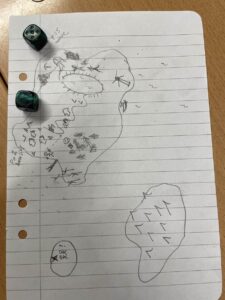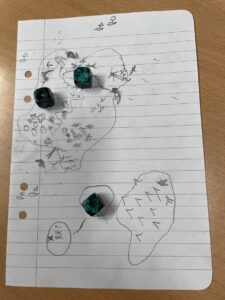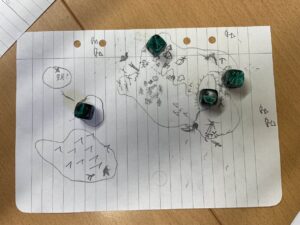I’ve been playing at Spelens Hus throughout the summer, but schedules have been so variable that no useful posting has been possible until we get some regular play in. The exception is three sessions of The Quiet Year, played by Emil, Denica, and me.
We set up a play-location sparked by the word “archipelago,” but not the textual pre-generated content. We began with Power in abundance but scarce Shelter and Minerals. A few of the features we initially drew became much more detailed through card draws’ requirements during play, e.g., the high mountain lake which took on a distinctive appearance and qualities.
Here are the map, the summary sheet (abundances, scarcities, names), and my notes at the end of session 1, when we’d made it partly into summer. Our community showed itself to be rather good at preparing for food and addressing physical difficulties like the need for timber, but sure enough, a stranger, a murder, fears of cannibalism at another island, and the ensuing problems started hollowing out the core resolve.

And the same for the end of session 2, which completed summer and autumn. This time, a hell of a lot got resolved, including the surprising rally to protect the place from the dangerous actually-cannibals attackers, but revelations about the power plant and waste site associated with the lake – especially the terrible illness wracking us through two necessary projects (thanks, cards!) proved almost too much, along with some significant deaths.

Session 2 also nailed some dedicated science fiction features into place, certainly as tropes, but also occasion for our own judgments and nuances. Is it good that we have access to nuclear power? The problems and projects that any of us assigned to the topic showcased that question, I think.
Here are the map and documents at the end of session 3 and the game, which as you can see, proceeded only two weeks into winter before the Shepherds arrived. Frankly, I think our community did pretty well, especially in arriving at “basic defense, now for next stage” regarding the power plant and the hostile other-islanders.

Since we didn’t focus on individual stories during play (as a rules-feature, as we often reminded one another), it was fun afterwards to point to named characters and follow their experiences through play in retrospect as a developing arc, without needing to make up new material.
The discussion afterwards
I’d played The Quiet Year before, but maybe … fifteen years ago, I think, and only once. I harbored some suspicions as to whether it was actually playable or, conversely, some performative hot air. However, Avery’s work pushes play from unusual angles, and I’ve generally found it to arrive as play after all even if it didn’t seem like it would from the text. I’ve found that to happen in several notable cases, and just as often, I’ve found a good-looking or convincing text to fall short.
If you’re familiar with the three of us, especially playing together, from many recordings presented here, you’ll know that this game would be a challenge for us and also an opportunity. After play concluded, and a bit of speculation about the Frost Shepherds, we talked about anything we’d observed or learned.
- Quietude is my casual term for an explicit rule, front and center in this game, that table-talk is absent for nearly all purposes, with the exception of rules-clarification, especially any “how about” workshopping or judgmental responses to whatever anyone says during their turn.
- More than one person, more than once, needed to talk through their own thinking when establishing content, especially a “new situation.” We established that such talking was not a dialogue, even if it seemed to imply questions, so the other people simply waited it out.
- Contempt – I don’t know how many people reading this are familiar with this feature, but the rule is, if you (the person) think that you’re not being heard and honored during play, then you take a little counter and put it in front of you. No explanation or discussion is allowed. It does nothing in rules/mechanics terms. You put it back into the pile when and if (i) you play someone or something selfishly or (ii) you play someone or something in
- In our game, two Contempt tokens were taken, and both were “paid” back into the pile.
- Each of these needed its own learning curve, which I maintain is an ordinary feature of play, and allows for no-fault mistakes as part of the process. I also think that nothing, no briefing, no textual phrasing, prepares any group past whatever they need to learn via play itself.
- For quietude, obviously, we were not good at this despite heroically trying, and the curve was definitely apparent. During the first session, anyone shushed anyone when they talked inappropriately, but not enough, so that talking was definitely too much.During the second, we reminded one another not to talk through gestures, or sympathetic glances among those of us who were restraining ourselves. Then finally, during the third, we managed our quietness quite well, and enjoyably so.
- For Contempt: notably when (contra the rules) one person explained why they’d taken it, regarding something I’d done, it hurt my feelings badly enough that I contemplated ceasing to play, and also contemplated whether its presence as a rule was basically abusive … but when (i) that point had been clarified, my unhappiness cleared up easily, and (ii) when we played the second Contempt token without explanations or comment, it was not only non-hurtful but generally unifying.
- Another point about the learning curve: there’s how to play this game (at all), and then, why a given person (i.e., “you”) actually wants to play and what they do with the processes and interactions for it
- Our third-session settling-in demonstrated that second stage. I’m not talking about what anyone “makes happen,” but about how we do it and about the enjoyment of content because it was provided, as opposed to how entertaining or gotcha it may be (both of which are wearying).
More generally, the intimacy of play felt special to me throughout, from the first moments in fact. I kept it to myself until the post-play conversation, when I found that Emil and Denica felt the same way. The sense that I wanted and valued the play/participation from each of them, and no one else, was very strong.
As part of that observation, I greatly appreciate that the game does not give anything to anyone, as a canned experience.


6 responses to “Until the shepherds arrive”
I’ve played the game twice.
When I played with three friends, we were all intrigued but found that the overall experience lacked punch (and the others also expected some kind of reckoning upon the arrival of the Frost Shepherds).
I think keeping quiet (not commenting, but also not looking for approving nods etc.) might address that problem, as it would prevent things from turning into a writers’ room.
If I play this again, I’ll definitely try this!
When I played it with my daughter, she angrily crumpled up the drawing when I did not mend my ways after she put out a contempt counter.
Also, I have a hard time wrapping my head around you guys playingfor several sessions. Any guesstimate of how long individual turns took or how much one person established?
I’m confused a little about “trying” the silence feature, because the text is definitely explicit and uncompromising about it. Are you saying that your play-groups talked about what to say (at all) or included agreement as an aspect of saying things?
Regarding time, for perspective, our sessions were about two hours each, with the third of course being only about twenty-five minutes.
At a memory-based estimate, Individual turns were about five minutes long, and sometimes more. When the procedures included group input, a turn was longer, although I don’t think they hit or exceeded ten minutes.
I totally overlooked that. I generally read rules carefully (though I might still have problems in execution) so my one possible explanation is that I might have skimmed that section with a residual attitude of “it’s just play advice and not important” (from years of playing RPGs full of inconsequential or contradictory advice).
I can’t believe what I’m reading. This isn’t a “section.” It’s the entirety of the game and infuses every instruction.
To miss this would require … some sort of almost-reading which is obsessed with only specific aspects of procedure, rendering into “blah blah blah” anything that’s not an expected instruction along the lines of an IKEA assembly insert, and then only for those things with which you’re familiar.
I’m not being snarky. The quietude as presented, textually, is unmistakably procedure, not in a single blithery “style of play” section, but throughout, including the pinpoint moments in which it is relaxed. Nor is it some qualitative feely thing you’re supposed to pick up obliquely. It’s as do this exactly like this as a text can get. I’m genuinely concerned! or perhaps simply stunned, at the glimpse of any process which dismisses content in its hunt for “insert tab A,” for tabs and As which are only of a particular appearance. I’m left wondering whether you’ve read any RPG text at all in a way I consider reading.
I’m putting you on a kind of personal notice to revise what you’re doing. Something about the way you’re picking up a text and looking at the words, or maybe something about the way you address text-and-play with these particular people, or maybe something about the combination of “understand + teach + play” is borked.
That hurt. But, as in the past, you gave fair warning and I did and do ask for the cestus.
I went through some defensiveness and self-flagellation, but have come to the conclusion that most of that played out differently than I reported. That sounds like a cop-out, but if you know me even a little bit, you realize that honesty or enganging in self-criticism is not one of my issues.
It’s been over a year since I played *A Quiet Year*, but judging from my memories of the game with my daughter, we must have followed the quietude rules: She’s usually vocal about grievances, certainly in 1-on-1 situations, and she blew up without forewarning — except, of course, for having placed a contempt counter. She’s very much into Norse gods and introduced them in parallel to my efforts of having a – vaguely? I don’t remember – Christian-themed church early on. Conflict ensued, I chose not to redress the situation on my turn or turns, and what seemed to me like introducing necessary and fitting problems soured the game for her.
As for when I played the game with three friends a few weeks later, I don’t remember much. I suspect we followed those rules, at least somewhat and at least initially, because I dimly recall myself enjoying the act of quietly – no pun intended – observing a lot (though that may have had to do with playing an unusual game and in the newly-founded splinter group of our regular group, too). I think I retroactively projected storyboarding discussions onto the game — the more I have thought about it, the less I am less convinced that much of that happened: Our village kidnapped another nobleman’s son (or something along those lines) and different players added to that in sometimes offbeat ways, and we all agreed that it was the only truly exciting thing to happen that night. Different players picking up this thread and at times surprising the others doesn’t point towards storyboarding (though it is certainly possible — discuss, then do the unexpected, for instance).
However, I have definitely pigeonholed the game as being all about drawing that map together (which was a major draw for playing it with my daughter as she loves to draw & doodle) and I also kind of dismissed it as touchy-feely: no dicing, no GM, and something about how it might allow for a deeper understanding of group conflict — how serious of a game could it be? The game with my daughter is, in fact, a testament to this very quality!
And after pigeonholing it, I remembered it as such (i.e. a drawing game).
And that’s still plenty shocking because quietude is indeed integral. A bit of that may have been lost in translation — quietude strikes me as an uncommon word, whereas in the German translation, there’s a section entitled “Zurückhaltung” (an everyday word for “restraint”) and I strongly suspect that’s the Quietude section I checked after the first response to my post. That said, the mechanics such as Calling for a Discussion only make sense in the context of quietude and indeed include explicit rules for talking (no talking back or even a second time). There are other examples throughout.
Appallingly, I missed quietude’s central role and it fell by the wayside in my memory (and probably in play, too, what with my blindess) and I never thought twice about it. Hence, this thread is an eye-opener and I am even in the mood to give it a second shot now.
As evidenced in my *InSpectres* and *Nicotine Girls* threads, among others, I do struggle with rules that do not fit my deeply ingrained preconceptions about RPGs, but at least I am mostly aware of the problem (repeatedly asking ‘dumb’ questions whose answers seem utterly obvious to others, for instance, or making a mess of unfamiliar rules despite best intentions etc.).
Only “mostly aware” because trying to make sense of something entails the risk of misunderstanding — and then, as with spelling mistakes in a manuscript, you might well be unable to see them anymore.
(This isn’t really possible with *A Quiet Year*, though, but that wasn’t the case here.)
I don’t know what to tell you. You post that you did X, I respond to X in good faith, then you say “Oh, but I didn’t actually do X.” It pulls the rug out from under people.
Please review what you write here to make sure it’s really what you did or mean. I’ve had enough “Oh, but actually” for one lifetime.